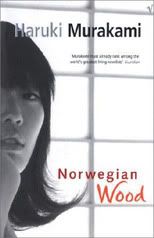
How often do I admit to liking something Japanese? How often do I admit to liking a romance novel? Never, right? Well here I am, about to do both of those things now. This book is damn good. No, really.
For those of you who don't know, 'Norwegian Wood' is the title of a Beatles song, and if you've heard it before, it almost echoes throughout the whole book, the melancholy tune and sentiment imbuing the work. The novel begins with a brief introductory chapter by Toru Watanabe, who upon hearing an orchestrial cover of the song, remembers his life about seventeen years ago, and the rest of the book retells those times. The murky ambiguity and confusion of The Beatles song is similar to the novel. It is a love story, or several love story. Baffling as love usually is. The Beatles sang: 'I once had a girl/or should I say/she once had me." Toru is similarly unclear as to how he should consider the relationships he is in.
There are two women involved. One is Naoko. In high school she was Toru's best (and only) friend's girlfriend, and the three of them got along really well. Then the best friend, Kizuki, committed suicide. Toru and Naoko didn't see each other for one year after the funeral. Toru wants to escape Kobe, where they grew up, and so he goes to a university in Tokyo. Here he runs into Naoko again who also goes to college here. They see each other on occasion, and make love once- after which she leaves Tokyo. Emotionally unstable, she returns to her family, and later on goes to live in a sort of sanitorium.
The second woman who Toru gets involved in is Midori, whom he meets after Naoko has left. She is in the same Drama class as him, and quite selfish and eccentric. Both Midori and Naoko are not entirely approachable. Both like, or even love Toru, but they are wary of having him close or revealing too much about themselves. Midori's father, who she says is in Uruguay is actually in the hospital. Toru accepts things as they are, and often tries to help but doesn't want to intrude on things. He is drawn to Midori, but feels an obligation to Naoko.
The story is told in an almost biographical style, which makes it feel all the more real because you feel like Toru is telling you his story. And the emotions, the way they are conveyed, the uncertainty surrounding them, they make this story feel all the more real. They make this story a lot more emotionally intense than your average love story.
Powerful in its delivery, and the reality that surrounds it.
8 out of 10. Minus two because it's from a Japanese author. XD

